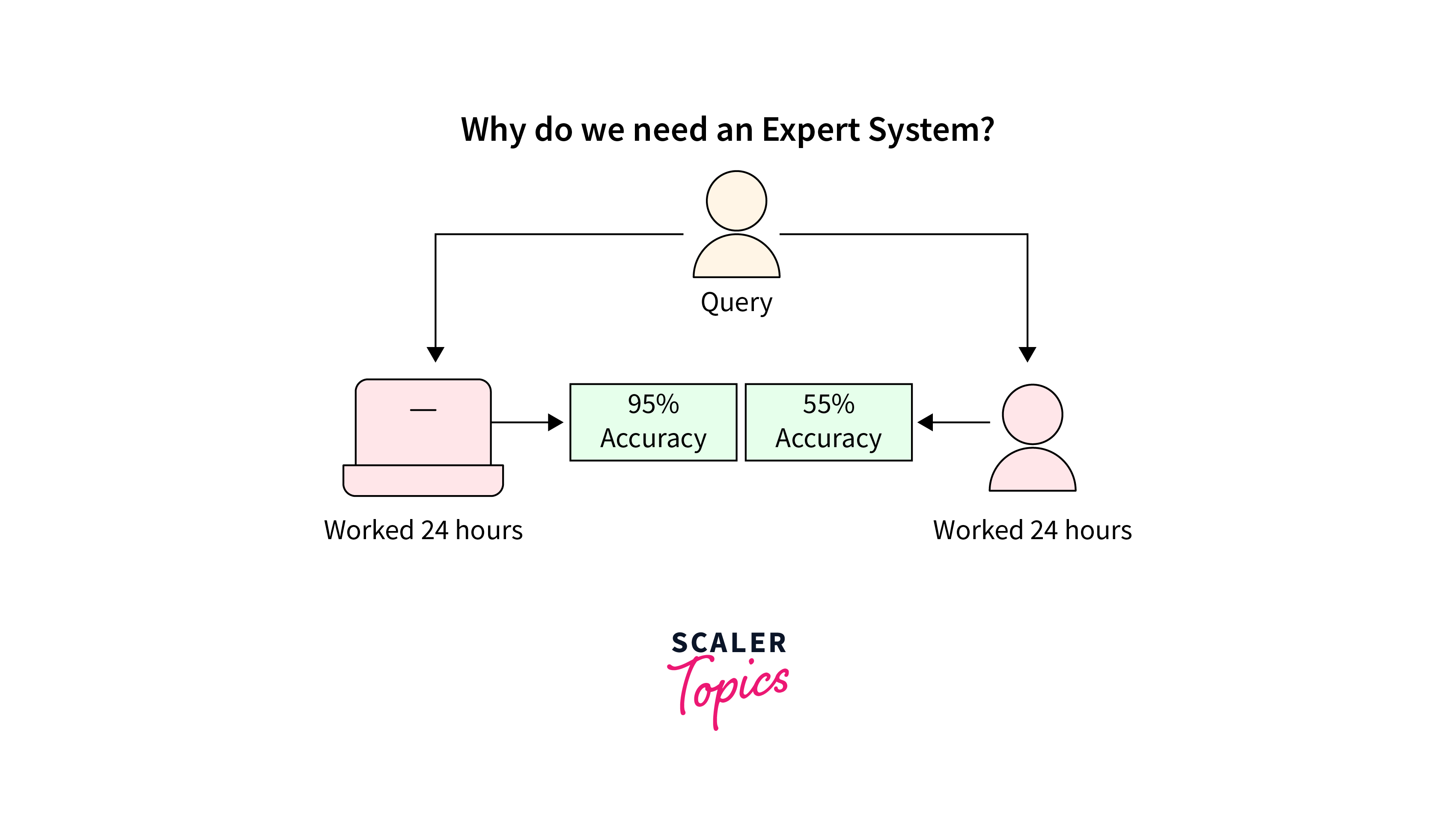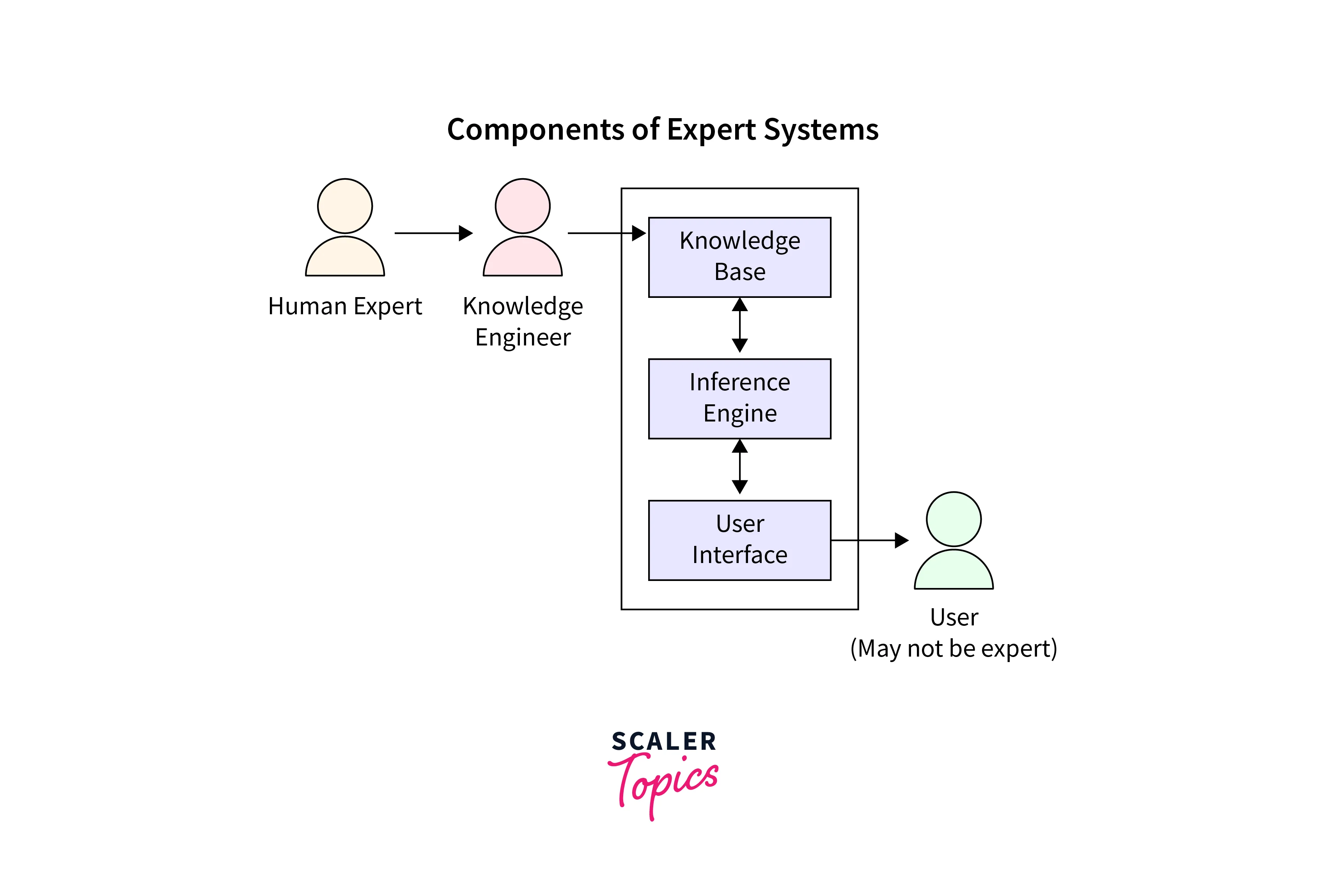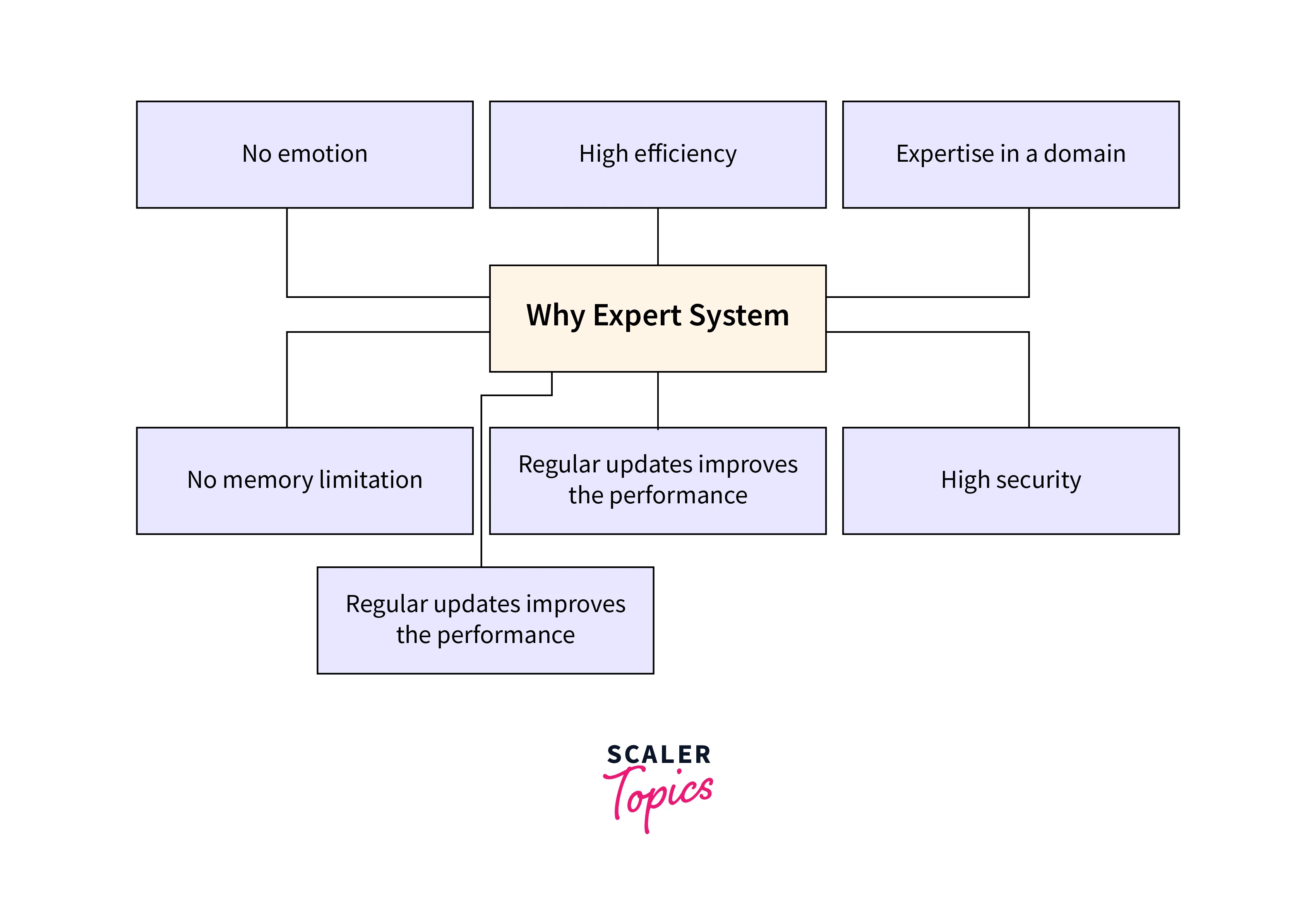Expert System In Artificial Intelligence
Overview
expert system in AI is a very crucial part of many transforming industries. Expert system in AI are knowledge-based systems that mimic human decision-making in specific domains. They have been widely used in fields such as healthcare, finance, manufacturing, and customer service. In this article, we will provide an overview of expert systems in AI, including their popular examples, characteristics, components, development process, capabilities, advantages, limitations, and applications.

Some Popular Examples of Expert Systems
-
DENDRAL: DENDRAL is a pioneering expert system that was developed in the 1960s at Stanford University. It was designed to interpret complex data from mass spectrometry and deduce the molecular structure of organic compounds. DENDRAL was widely used in the field of chemistry and played a crucial role in the development of computational chemistry.
-
MYCIN: MYCIN is a well-known expert system that was developed in the 1970s at Stanford University. It was designed to assist doctors in diagnosing and treating bacterial infections. MYCIN used a knowledge base of medical information and rules to provide recommendations on appropriate antibiotics and dosages.
-
PXDES: PXDES (Protein X-Ray Diffraction Expert System) is an expert system developed by the National Institutes of Health (NIH) for analyzing protein structures using X-ray crystallography data. PXDES assists researchers in interpreting complex data and provides insights into the three-dimensional structure of proteins.
-
CaDeT: CaDeT (Cancer Diagnosis and Treatment) is an expert system developed by the National Cancer Institute (NCI) for assisting oncologists in diagnosing and treating various types of cancer. CaDeT uses a knowledge base of medical data and rules to provide recommendations on treatment options based on the specific type and stage of cancer.
Characteristics of Expert Systems
One of the key characteristics of expert systems is their ability to reason and make decisions based on a set of rules or knowledge base. Expert systems typically rely on symbolic or rule-based reasoning, where they process information using logical rules and infer new information from known facts. They are capable of learning and updating their knowledge base, allowing them to improve their accuracy over time. They designed to be user-friendly and provide explanations for their decisions, making them a valuable tool in decision-making processes where human expertise is not readily available. The major characteristics of an expert system in AI are:
-
High Performance: Expert systems are designed to perform at a high level of accuracy and efficiency. They can process large amounts of data and make decisions based on complex rules and reasoning, making them highly reliable in providing accurate solutions.
-
Understandable: Expert systems are designed to be understandable by non-experts. The knowledge base and rules are structured in a way that can be easily interpreted and explained to end-users, allowing them to understand the decision-making process of the expert system.
-
Reliable: Expert system in AI is built on a foundation of reliable and validated knowledge. The knowledge base is carefully curated and updated with the latest information to ensure that the expert system's recommendations are reliable and trustworthy.
-
Highly Responsive: Expert systems are capable of providing real-time solutions and recommendations. They can quickly process data, apply rules, and provide timely responses, making them highly responsive in time-critical situations.
Components of Expert Systems

There are three major components in Expert Systems.
-
User Interface: The user interface is the component of an expert system that allows users to interact with the system. It can be a graphical user interface (GUI), a command-line interface, or a web-based interface. The user interface enables users to input data, receive recommendations or solutions, and provide feedback.
-
Inference Engine: The inference engine is the core component of an expert system that applies rules and reasoning to deduce new conclusions from the knowledge base. It uses various techniques such as forward chaining, backward chaining, and fuzzy logic to derive solutions from the input data and the knowledge base.
-
Knowledge Base: The knowledge base is the repository of domain-specific information and rules in an expert system. It contains data, facts, heuristics, and rules that are organized in a structured format. The knowledge base is curated and updated regularly to ensure that the expert system has the latest and most accurate information for decision-making.
Development of Expert Systems:
The development of expert systems typically involves several key participants:
-
Expert: The expert is the domain-specific professional who possesses the knowledge and expertise in a particular field. The expert provides the input data, rules, and heuristics that form the basis of the knowledge base. Their insights and expertise are critical in building an effective and accurate expert system.
-
Knowledge Engineer: The knowledge engineer is responsible for capturing, organizing, and encoding the knowledge provided by the expert into the knowledge base of the expert system. They work closely with the expert to understand their decision-making process and translate it into a structured format that can be processed by the inference engine.
-
End-User: The end-user is the individual or group who interacts with the expert system to seek solutions or recommendations. The end-user provides input data, receives recommendations or solutions, and may provide feedback to improve the performance of the expert system.
Why Use an Expert System?

Expert systems offer several benefits that make them valuable in various domains:
-
Capabilities: Expert systems are capable of processing and analyzing large amounts of data quickly and accurately. They can handle complex decision-making tasks and provide recommendations or solutions based on rules and reasoning.
-
Efficiency: Expert systems automate decision-making processes, reducing the time and effort required to analyze and interpret data. This leads to increased efficiency and productivity in domains where decision-making is complex and time-sensitive.
-
Accuracy: Expert systems are built on reliable knowledge bases that are curated and updated regularly. This ensures that the recommendations or solutions provided by the expert system are accurate and trustworthy.
-
Scalability: Expert systems can be easily scaled and adapted to different domains or industries. The knowledge base can be updated and expanded to accommodate changes in the domain or to include new information, making expert systems highly adaptable.
Advantages of Expert Systems
-
Improved Decision-making: Expert systems provide accurate and consistent recommendations or solutions based on the domain-specific knowledge and rules encoded in the knowledge base. This leads to improved decision-making and reduces the risk of human errors.
-
Increased Efficiency: Expert systems automate decision-making processes, reducing the time and effort required to analyze data and provide recommendations. This results in increased efficiency and productivity in various domains.
-
Cost-effective: Expert systems can be a cost-effective solution compared to hiring multiple domain experts. Once the expert system is developed, it can be easily scaled and used by multiple users, making it a cost-effective option for organizations.
-
Enhanced Accessibility: Expert systems make domain-specific knowledge and expertise accessible to a wider audience. Non-experts can use expert systems to gain insights and make informed decisions in areas where they lack expertise.
Limitations of Expert Systems
-
Limited Domain: Expert systems are designed for specific domains and may not be applicable or effective in domains outside their scope. They rely heavily on the accuracy and completeness of the knowledge base, and if the knowledge base is not comprehensive, the expert system may not perform optimally.
-
Lack of Common Sense: Expert systems may lack common sense reasoning and may not be able to handle ambiguous or uncertain situations effectively. They rely solely on the information and rules encoded in the knowledge base, and may not be able to adapt to situations that require human intuition or creativity.
-
Maintenance and Updates: Expert systems require regular maintenance and updates to keep the knowledge base accurate and up-to-date. This may require continuous efforts from the knowledge engineer and the expert to ensure the expert system's effectiveness.
-
Overreliance on Expert Knowledge: Expert systems heavily rely on the knowledge provided by the domain expert. If the expert's knowledge is biased or incomplete, it may impact the accuracy and reliability of the expert system's recommendations or solutions.
-
Lack of Learning and Adaptability: Traditional expert systems do not have the ability to learn from new data or adapt to changing circumstances. They rely solely on the knowledge base and rules encoded during their development, which may limit their adaptability in dynamic domains.
Applications of Expert Systems
Expert systems have found applications in various domains, including:
-
Designing and Manufacturing: Expert systems are used in the design and manufacturing domain for tasks such as product design, process optimization, quality control, and fault detection. They can analyze complex data and provide recommendations for improving design or manufacturing processes.
-
Knowledge Domain: Expert systems are used in knowledge-intensive domains, such as legal, intellectual property, and patent searches, where they can quickly analyze and interpret large volumes of data to provide insights and recommendations.
-
Finance Domain: Expert systems are used in the finance domain for tasks such as risk assessment, investment portfolio management, and fraud detection. They can analyze financial data and provide recommendations for making informed investment decisions or detecting potential fraud.
-
Diagnosis and Troubleshooting of Devices: Expert systems are used in the diagnosis and troubleshooting of complex devices such as computer systems, medical equipment, and automobiles. They can analyze symptoms and provide recommendations for identifying and resolving issues.
-
Planning and Scheduling: Expert systems are used in planning and scheduling tasks in domains such as logistics, transportation, and project management. They can analyze complex data and optimize schedules for efficient resource allocation and decision-making.
Conclusion
In this article we talked about how expert systems are a powerful application of AI that leverage domain-specific knowledge and rules to provide accurate and reliable recommendations or solutions.
- They have been successfully applied in various domains, including designing and manufacturing, knowledge domain, finance domain, diagnosis and troubleshooting, and planning and scheduling.
- Some major examples of expert system in AI includes DENDRAL, MYCIN, CaDeT, etc.
- They prove to be beneficial as they are Highly Reliable, Responsive, with improved performance than the other systems.
- Every expert system typically consists of three major components User Interface, Inference Engine and Knowledge Base. It is around these three components the whole system revolves.
- It is advantageous over other systems because of its efficiency, improved decision making, better accessibility and overall it is very cost effective.
- Expert systems also have limitations such as their domain-specific nature, lack of common sense reasoning, maintenance and updates requirements, overreliance on expert knowledge, and lack of learning and adaptability.
- Despite these limitations, expert systems continue to be valuable tools in assisting decision-making in complex domains, and further advancements in AI and machine learning may overcome some of these limitations in the future.
